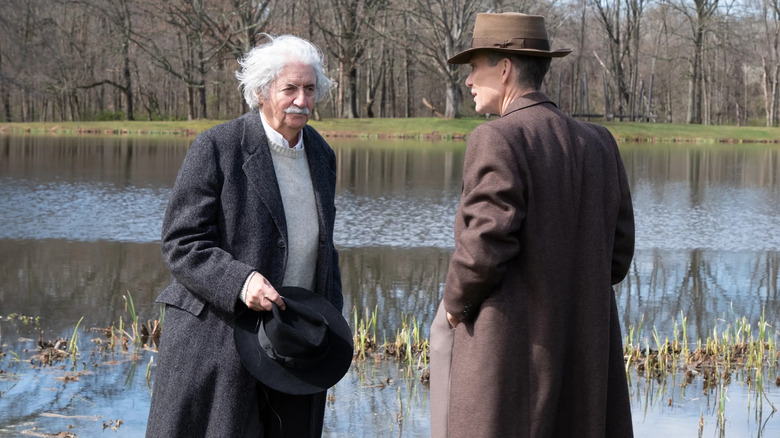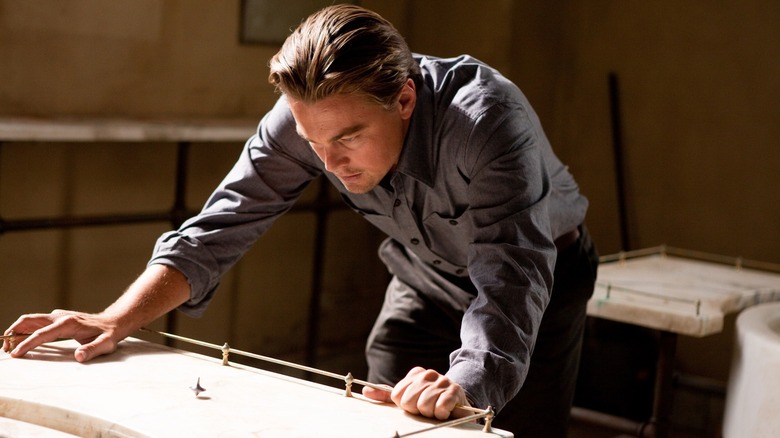Christopher Nolan Sees A Link Between The Endings Of Oppenheimer And Inception
This article contains spoilers for "Oppenheimer."
Every Christopher Nolan film is grounded in reality, giving everything from anterograde amnesia to the Caped Crusader to interstellar space travel a concrete basis from which to jump off into thrilling fantastical events. While the majority of Nolan's films — even "Tenet" — have a semblance of real-world plausibility through his use of science and physics, his most overall out-there movie is "Inception," the 2010 action drama concerning a group of professional "extractors" who can either remove or implant information in other people through shared lucid dreaming. Though the phenomenon of lucid dreaming has some merit, such technology or ability is pure science fiction.
Yet today's science fiction can become tomorrow's science fact, something that was known all too well by theoretical physicist J. Robert Oppenheimer. Nolan's latest film, "Oppenheimer," is a biopic about the scientist who helped build the atomic bomb, a task that most laymen — and even a good handful of scientists — would've thought impossible before it was actually accomplished by Oppenheimer's team in the mid-1940s. At first glance, there's not a ton of similarity between "Inception" and "Oppenheimer"; there are certainly themes and tropes that they have in common, elements that turn up in virtually every one of Nolan's films, yet "Inception" is a far breezier adventure film while "Oppenheimer," though paced like an action movie, deals with the weight of history.
That said, both movies' endings have a stylistic and thematic kinship, especially in the way they combine low-key moments with major ramifications and create a moral and intellectual ambiguity that lingers far beyond the end credit roll.
The complexity of Nolan
Speaking recently to Maria Streshinsky at Wired, Nolan was asked about the fact that his films tend to be relatively uptempo experiences on the whole, despite dealing with dark or even bleak subject matter. On the topic of whether his films have a message that's nihilistic or not, the director said:
"I mean, the end of 'Inception,' it's exactly that. There is a nihilistic view of that ending, right? But also, he's moved on and is with his kids. The ambiguity is not an emotional ambiguity. It's an intellectual one for the audience. It's funny, I think there is an interesting relationship between the endings of 'Inception' and 'Oppenheimer' to be explored. 'Oppenheimer's' got a complicated ending. Complicated feelings."
Nolan's relationship with ambiguity and complexity stems from his early work being steeped in the tenets of film noir, a genre famous for featuring hard-boiled characters involved in deeds that are hardly cut-and-dried in terms of morality. Or, put another way, hardly black and white, leading to Nolan's cheeky use of the format in "Following," "Memento," and now "Oppenheimer."
Every Nolan film builds in as many layers of complexity as it can (narratively, stylistically, structurally, etc.) in order to lead to this myriad of emotions clashing with intellect. Like any great philosophical artist, Nolan isn't interested in providing answers as much as asking questions, encouraging the audience to draw their own conclusions. In other words, he's not a nihilist but rather a highly agnostic filmmaker, attempting to encapsulate as much complexity and possibility as exists in life without being so bold as to assume a definitive opinion. That approach can either delight or frustrate, sometimes both at once.
Inception: a family reunion vs. a spinning top
Although Nolan is no nihilist, he certainly allows for nihilism in his work — look no further than the existential crises posed at the conclusions of "Memento" and "The Prestige." The finale of "Inception" is one of Nolan's most subversive endings, insofar as it plays at face value all the while reminding the audience that it can't be taken as such. That's because, of course, the entire film offers the possibility that reality has become meaningless in the wake of people existing in dream states and being convinced — or convincing themselves — that they are not.
The ending sees the long-suffering fugitive Cobb (Leonardo DiCaprio) finally arriving back home in America after completing a job for an employer that has used their influence to allow his criminal charges to be cleared. Arriving at his home and seeing his two young children after years of separation, he takes a brief moment to employ a reality test, spinning his late wife's "totem," a spinning top, on a table. As we've been shown earlier in the film, these totems behave irrationally when used in a dream state, and in the top's case, it will continue spinning forever if this is indeed a dream. While Cobb goes off to greet his kids before checking to see if the top falls or not, Nolan's camera pushes in on the top as it wobbles, cutting to black before a definitive answer is shown.
The ultimate emotional "answer" of "Inception" is that the top's fate doesn't matter — Cobb is happy, and life goes on no matter what. What Nolan refers to as the potential intellectual nihilism of the ending revolves around whether Cobb is merely choosing to fool himself, to willfully live in a fantasy. And, by extension, whether we the audience are doing the same, so taken by the emotional catharsis of the moment that we may be fooling ourselves, too.
Oppenheimer: the destruction of just a relationship or the entire world?
The ending of "Oppenheimer" may be Nolan at his bleakest, the scene not only summing up the "impossible questions" (as the director put it) of Oppenheimer's actions and their consequences, but underlining how these consequences may be inescapable.
The last moments show what was actually said between Oppenheimer and Albert Einstein (Tom Conti) on a fateful day in 1947 when Oppenheimer was being courted by Lewis Strauss (Robert Downey Jr.) to head the Institute for Advanced Study at Princeton. Nolan depicts the moment from Strauss' perspective early in the film: the businessman sees the scientists' private dialogue and Einstein's supposed slight of him as Oppenheimer poisoning the famous physicist against him.
Of course, it's revealed that the scientists didn't talk about Strauss at all. Instead, they mull over an earlier issue, one where Oppenheimer consulted Einstein on calculations that seemed to indicate the possibility that detonating the atomic bomb could've caused an unstoppable chain reaction that engulfed the world. Einstein laments Oppenheimer falling prey to the same political forces that he did, and Oppenheimer wonders if that chain reaction they feared isn't already happening in the form of the nuclear arms race he's powerless to stop.
It's here that Nolan's structure of the film — bouncing back and forth between Strauss's and Oppenheimer's viewpoints — comes into fruition, revealing that both men were feeble, egotistical, and deluded enough to allow some major mistakes to be made that have enormous consequences.
Victory at what cost
Though the endings of "Inception" and "Oppenheimer" are tonally near opposites, they function in the exact same way, in presenting the audience with an intellectual dilemma. In fact, the majority of Nolan's endings depict some form of pyrrhic victory: the detective of "Memento" is revealed to be the architect of his own never-ending investigation, the titular hero of "The Dark Knight" is forced to publicly make himself a criminal, and the English army manages to find victory in defeat after the events of "Dunkirk." Even in Nolan's more "happy" endings — of which "Inception" is one — there's a strong element of irresolution.
On top of the political and philosophical underpinnings within the endings of "Inception" and "Oppenheimer," Nolan is continuing to use his art to ask even larger questions (in a meta sense) about movie endings in general. To wit: "Inception" is a "happy" ending and "Oppenheimer" is a "sad" ending on the surface, yet both endings see the protagonists victorious at what they initially set out to achieve. The ultimate sly joke one discovers when comparing the two films is that in "Inception," that victory supersedes any question of reality, whereas in "Oppenheimer," the "impossible questions" far outweigh any satisfaction of achievement. As the director succinctly put it, walking out of any Nolan film leaves you with "complicated feelings," indeed.




